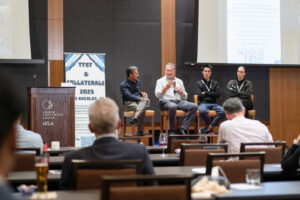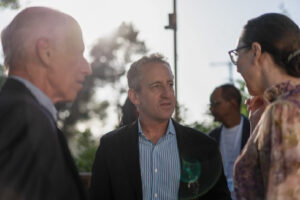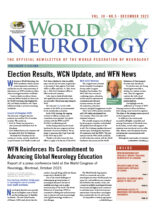
Amir Molaie

David Liebeskind
By Amir Molaie and David Liebeskind
In the rapidly evolving field of stroke care, events that gather global experts to discuss recent trials and innovations are integral to disseminating knowledge and advancing care. Building on the momentum of the 15th World Stroke Congress, the 2023 International Symposium on Thrombolysis/Thrombectomy and Acute Stroke Therapy (TTST) and the 10th annual Symposium on Collaterals on the Brain (Collaterals), proved no exception. The two conferences, held in conjunction at the University of California, Los Angeles (UCLA) Oct. 13-17, 2023, brought together leading experts from around the world to review and deliberate wide-ranging, timely topics in neurovascular care.

Panel discussion on the potential use of generative AI in future vascular and endovascular care, featuring (left to right): Ashutosh Jadhav, MD, PhD; Andrei Alexandrov, MD; Kunakorn Atchaneeyasakul, MD; Alexandra Czap, MD.
The events were hosted by Prof. David Liebeskind in a hybrid virtual and in-person format, assembling 165 attendees. Participants joined from countries on six continents, ranging in background from clinicians and researchers to biomedical engineers and medical students.
The program began with the TTST 2023 portion, with presenters offering their data and input on endovascular thrombectomy for special populations, including late window cases, distal occlusions, and patients with low NIHSS. This was followed by up-to-date summaries of the recently published and newly presented large-core trials. The first day wrapped up with lectures on innovative technologies, including prehospital triage devices and an interactive dialogue on the rising impact of artificial intelligence on stroke care.

Conference dinner hosted by David Liebeskind, MD, pictured here with James Grotta, MD (left) and Alexandra Czap, MD (right).
The following day featured lively discussions regarding the use of alteplase versus tenecteplase, and the overarching role of intravenous thrombolysis prior to mechanical thrombectomy (MT). Sessions also delved into the merits of neuroprotection and the optimization of MT techniques. The day ended with a unique Jeffersonian-style exchange, a forum which fostered interactive, candid, and impassioned conversations involving participants from all levels of training and backgrounds.
The final day of TTST highlighted issues related to stroke systems of care, topics which seamlessly segued into the Collaterals Symposium. These next three days showcased accomplished presenters from throughout the world commenting on their impressive advocacy and contributions to expanding stroke treatment to regions with previously limited access to thrombolysis and thrombectomy. Nearly every geographic region was represented, with speakers converging from afar, including Aida Kondybayeva, MD, PhD, joining from Kazakhstan, and Ossama Mansour, MSc, MD, PhD, from Egypt.

Radoslav Raychev, MD (left) and Aida Kondybayeva, MD, PhD (right) in conversation.
In the spirit of global collaboration and progress in the neurovascular field, TTST and Collaterals embodied the power of shared knowledge and dedication to shaping the future of stroke care on a worldwide scale. We look forward to the advances and work to come in 2024. •
David Liebeskind is professor of neurology at UCLA, director of the Neurovascular Imaging Research Core, and director of the UCLA Comprehensive Stroke Center.
Amir Molaie is a neurology resident at UCLA.
